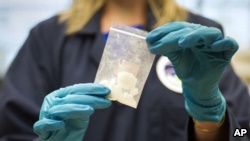正文
VOA常速英语:Unified Effort Needed Against Synthetic Drugs(翻译)
Illicitly used Synthetic drugs are chemically produced psychoactive substances that mimic the effects of illegal narcotics, which have been altered just enough to avoid classification as illegal. And this is one reason why these chemicals are dangerous. Since the formula for any given drug is constantly changing to stay one step ahead of the law, it is challenging to predict the effects the new chemical will have on the user's body.
Indeed, synthetic drugs are among of the most destructive substances on the illicit market – especially synthetic opioids. According to the Centers for Disease Control and Prevention, in 2015, over 33,000 overdose deaths in the U.S. involved prescription or illicit opioids – an increase of nearly 60% over the last 5 years, and nearly 60 percent of those deaths involved heroin or synthetic opioids like fentanyl.
Despite this, there is every indication that the manufacture and availability of these substances are increasing.

“Transnational criminal organizations dealing with illicit drugs are relying increasingly on synthetic products to harm our societies. They operate complex supply and distribution networks that cross multiple international boundaries,” said Principal Deputy Assistant Secretary for International Narcotics and Law Enforcement Affairs Luis Arreaga at the Bangkok Three Conference in late February.
“The U[nited] N[ations] reports that more than 700 new psychoactive substances have emerged over the last five years, and what we know about these substances is disconcerting and challenging because the international architecture set up to treat drug abuse and control the spread of those substances has not kept pace. We must adapt and use all the tools at our disposal.”
Together, the international community must take four measures, said Mr. Arreaga. First, we must reduce the number of first time users, particularly the young, through education, prevention, and treatment.
Second, we must share information on new substances across borders, to prepare for emerging trends.
Third, we must develop flexible domestic systems that can handle the influx of new drugs.
And finally, we must continue to use the international illicit drug control treaties to defend against the most prevalent and dangerous substances.
“Psychoactive substances require urgent attention from the international community,” said Principal Deputy Assistant Secretary Arreaga.“Decades of our mutual experience battling the drug problem have shown that voluntary international cooperation is vitally important.”
相关文章
- VOA常速英语:日增20万确诊病例,印度疫情失控
- VOA常速英语:美国驱逐10名俄罗斯外交官
- VOA常速英语:US Marks One Year of Pandemic Shutdown with Hope, Concern
- VOA常速英语:US Senate Nears Vote on $1.9 Trillion Biden COVID Aid Package
- VOA常速英语:What Is Clubhouse and Why Did It Get So Popular?
- VOA常速英语:Thermal Water Helps Recovering COVID Patients
- VOA常速英语:Deadly Drug Overdoses Epidemic Rages On
- VOA常速英语:International Women’s Day Marks Year of Increased Hardships for Women Worldwide
- VOA常速英语:US States Relax Restrictions, Health Officials Warn Against It
- VOA常速英语:Virginia Starts Reopening Schools for In-Person Learning




 手机网站
手机网站